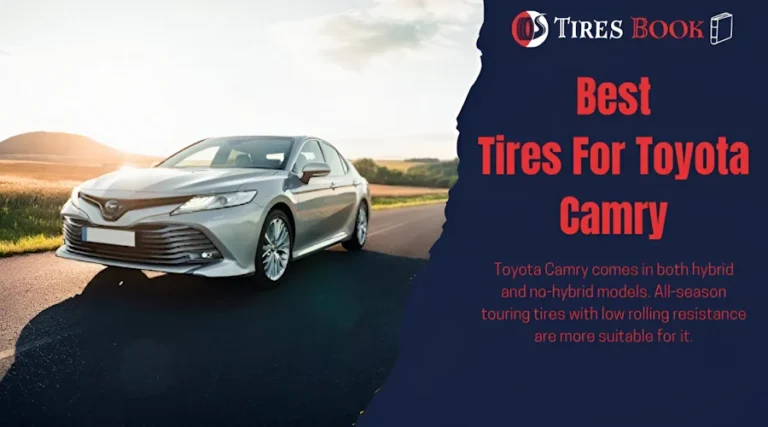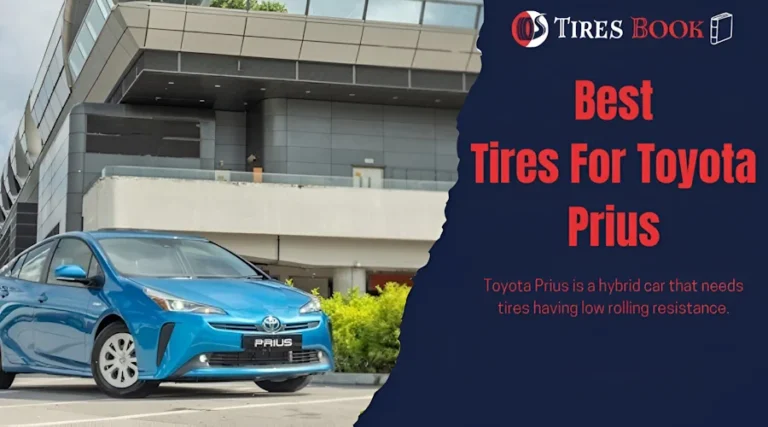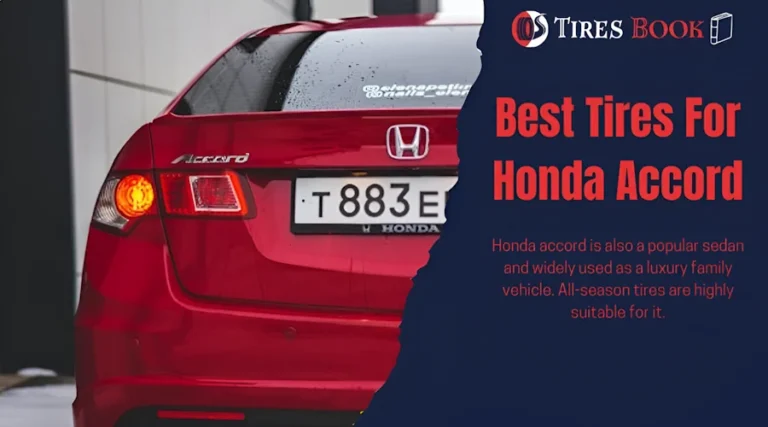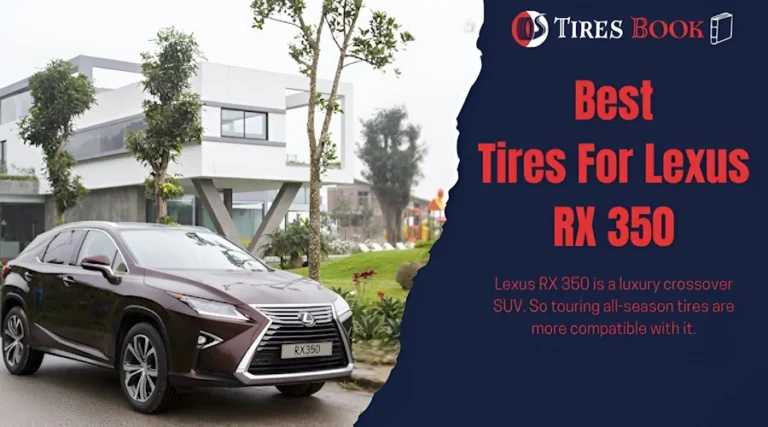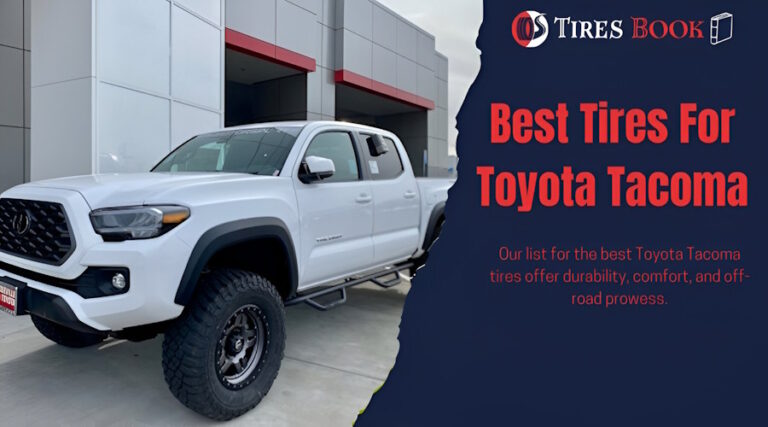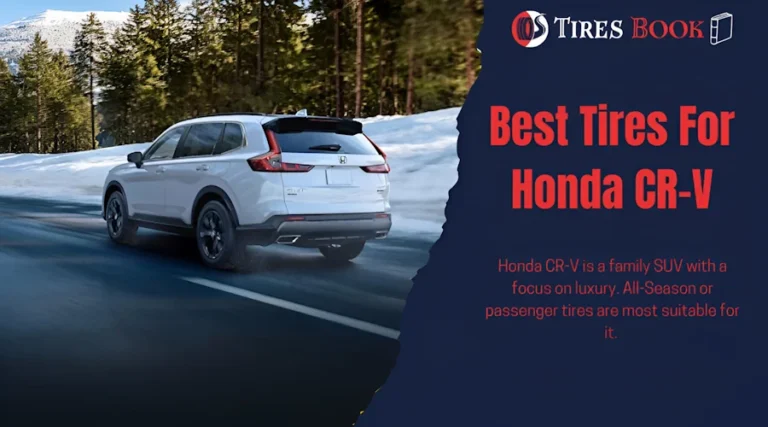When it comes to finding the best tires for your Honda Civic, the choices can be as diverse as the Civic itself. From the efficient LX model to the luxurious EX-L and from Touring trims to the high-performance Si and Type R models, Honda Civic offers a wide range of driving experiences.
To make the most of your Civics’ potential, selecting the right set of tires is essential. With options available for both the 10th-generation Civic (2016-2021) and the 11th-generation Civic (2022-onwards), it’s crucial to consider various factors in your decision-making process. Your driving style, road conditions, and weather patterns in your area should all play a role in your tire selection.
How Do We Select the Best Tires?
We don’t just pick the tires randomly. There is a lot of work behind suggesting the lists of the best possible tires for readers and buyers. We adopt a multi-dimensional approach rather than just a ‘single person experience’. Our lists and reviews are a collective wisdom of many users rather than a single user.
To determine the best tires, we undertake extensive market research, meticulously examine the specifications of each tire, and carry out a very thorough analysis of user reviews from top retailers. Finally, our keen tire experts apply their experience and expertise and provide a well-rounded assessment to create the final list of the best possible tires. Read our detailed review process.
Table of Contents
Details of the 9 Best Tires for Honda Civic In 2024
1. Pirelli P7 AS Plus 3
The Pirelli P7 AS Plus 3 is my best pick for Honda Civic. This all-season tire ranks number #1 for most luxury sedans. Pirelli offers a 70,000 miles/6 years warranty on P7 AS Plus 3.
Pros
Cons
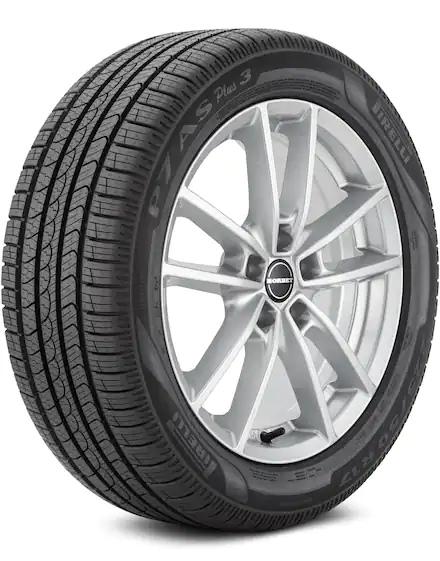
Overall Rating
| Treadwear | 9.2 |
| Dry Traction | 9.2 |
| Wet Traction | 8.9 |
| Winter Performance | 8.4 |
| Noise and Comfort | 9.1 |
| Price | 8.9 |
Our Verdict
Pirelli P7 AS Plus 3 is well-built for wet/dry traction, tread life, snow grip, responsive steering, and handling.
The tire features a stylish architecture that delivers excellent grip on various roads. Also, its dry cornering grip and steering response are top-notch, thanks to the larger outboard shoulder blocks.
The Pirelli’s balanced grooves and sipes distribution help to limit void space. This enhances more contact with the road. Also, its deep sipes create solid biting edges for exceptional wet and slippery road performance. Meanwhile, its generous circumferential grooves boost the tire’s hydroplaning resistance.
When it comes to winter traction performance and tread wear enhancement, the tire’s full-depth features play a vital role. However, you may struggle in deep snow with this tire.
Here’s my recommendation: If you want the best out of this tire, I will advise you to drive more often on highways, paved roads, and public roads. Using them on rough terrains can alter their performance and lifespan. These tires usually get damaged easily in rough terrains.
Many users have testified about this tire’s performance in heavy rain and snow. Although the wet traction needs some improvement, users have praised the dry traction. Also, there is positive feedback on its noise-free drive and service life.
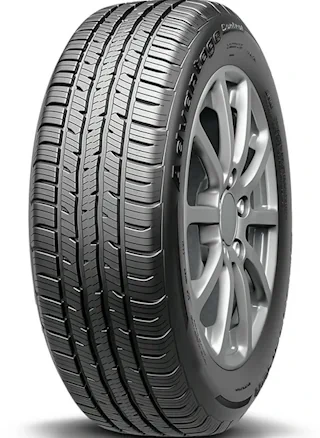
2. BFGoodrich Advantage Control
The BFGoodrich Advantage Control is one of the highly-rated all-season tires for the Honda Civic. BFGoodrich offers a 6-year/75,000-mile warranty on its Advantage Control tires (V and W-rated) and a 65,000-mile warranty on H-rated tires.
Overall Rating
| Treadwear | 9.0 |
| Dry Traction | 9.3 |
| Wet Traction | 9.0 |
| Winter Performance | 8.5 |
| Noise and Comfort | 8.7 |
| Price | 8.9 |
Pros
Cons
Our Verdict
If you’re looking forward to buying tires with top-notch handling and confident control, get the BFGoodrich Advantage Control.
This tire is designed for a comfortable ride and long tread life. I can assure you of high-performance all-season traction with this tire.
Furthermore, its sidewall stabilizers reinforce the tire’s sidewall. This helps to retain its responsive steering inputs and crisp handling. The tire’s traction performance is amazing when cornering in dry conditions.
The tire also features wide, circumferential grooves as well as generous lateral notches with Aqua-Flume Technology. This leverages a curvilinear groove network for accelerating and dispersing water from the tire’s contact patch.
Users’ feedback reveals that the tire’s tread wear happens evenly. You can be sure of proper even wear when you engage in routine rotation. Users have also given positive feedback about its snow and wet traction performance. However, one area where this tire has a drawback is a little decline in fuel efficiency, possibly due to its heavy weight.
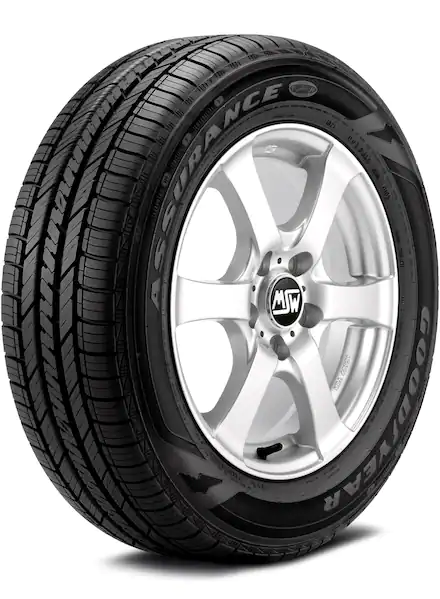
3. Goodyear Assurance Fuel Max
The Goodyear Assurance Fuel Max is a standard touring all-season tire manufactured by Goodyear. It comes with a 70,000 miles/ 6-year treadwear warranty.
Overall Rating
| Treadwear | 8.4 |
| Dry Traction | 8.8 |
| Wet Traction | 8.0 |
| Winter Performance | 7.0 |
| Noise and Comfort | 9.5 |
| Price | 8.8 |
Pros
Cons
Our Verdict
Goodyear Assurance Fuel Max is built for reliable wet/dry traction and fuel efficiency.
If all these qualities with affordability are your earnest desire as a Honda Civic owner, then you have it right here. The tire’s low rolling resistance enhances fuel economy, which is an important need for most users. This tire is built with strong shoulder blocks in the inboard and outboard tread areas. This enhances proper handling in dry road conditions.
Furthermore, the Goodyear Assurance Fuel Max tire’s tread zone also has Dual Aquachannel grooves, which help to evacuate water efficiently. With this, you can enjoy an excellent wet-weather traction performance. However, its wet traction is best when engaging slower to average speed.
Some users have advised that it is not the best for snowy conditions. Other users are lavish in praising the tire for its fuel efficiency. However, users also report early tread wear which is not uncommon for tires with low rolling resistance.
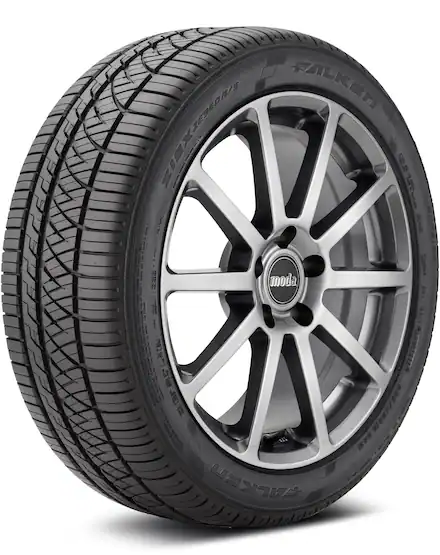
4. Falken Ziex ZE960 A/S
The Falken Ziex ZE960 A/S is a new tire from Falken. The tire’s affordable price makes it highly suitable for low-budget users. This tire is uniquely designed for premium sedans such as Honda Civic. Falken offers a 65,000 mile/5 years treadwear warranty on this tire.
Overall Rating
| Treadwear | 8.8 |
| Dry Traction | 8.8 |
| Wet Traction | 9.3 |
| Winter Performance | 9.1 |
| Noise and Comfort | 8.4 |
| Price | 9.6 |
Pros
Cons
Our Verdict
Falken Ziex ZE960 A/S is built with an excellent dry and wet grip, light snow traction, and exceptional braking.
From my personal observation, I can see that the tire’s outer shoulder is broader than the inner. This feature helps to enhance its cornering stability. There are also three wide circumferential grooves fed with generous lateral notches. These features effectively evacuate water to enhance the tire’s stability when going over standing water.
The tire’s second tread block line is designed with canyon grooves, which enhance snow traction. Meanwhile, the third tread line block comes with several small sipes that enhance wet-road traction performance.
Due to its high-end features, especially the variance in the outer and inner shoulders, the tire requires careful installation.
Many user feedback reveals that customers are satisfied with this tire. They seem to like its freeway speed during heavy rain as there is hardly any slipping.
Others say that the tire’s dry grip is amazing. Some have also praised its off-the-line starting in Sport mode as quicker. It seems like an all-weather tire despite not having a 3PMSF rating.
Despite producing some noise on highways, most users have rated this tire as delivering a smoother and more comfortable ride.
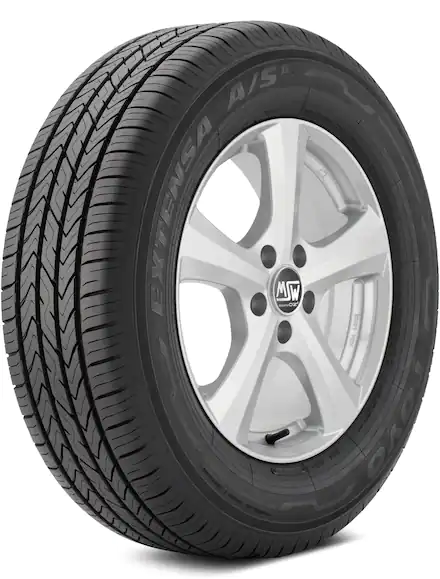
5. Toyo Extensa A/S II
The Toyo Extensa A/S II is another powerful all-season tire for your Honda Civic. You can get up to 75,000 miles with its 5-year tread life warranty. Amazing right?
Overall Rating
| Treadwear | 9.3 |
| Dry Traction | 8.7 |
| Wet Traction | 9.0 |
| Winter Performance | 8.0 |
| Noise and Comfort | 8.6 |
| Price | 9.5 |
Pros
Cons
Our Verdict
Toyo Extensa A/S II is another affordable tire with the best tread life among its counterparts. The tire features a special rubber compound that enhances its performance on wet roads and also improves fuel economy.
The high-performance tire is built with four wide grooves within the tread. This helps to improve hydroplaning resistance. The tire’s handling, control, and braking are also top-notch, making it suitable for Sports cars.
The tire’s long lifespan and comfortable ride tops the list of users’ reviews. Users also say that it could be loud on the road. Nevertheless, this isn’t obstructing.
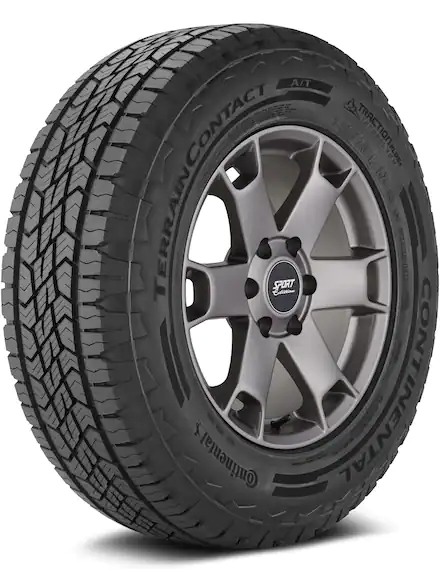
6. Continental TerrainContact A/T
The Continental Terrain Contact A/T tire is built for Honda Civic owners who frequently drive on rough terrains and uneven roads. You will attain 60,000 miles with a 6-year warranty on this tire.
Overall Rating
| Treadwear | 8.8 |
| Dry & Wet Traction | 8.9 |
| Off-Road Performance | 8.6 |
| Winter Performance | 8.4 |
| Noise and Comfort | 9.1 |
| Price | 8.7 |
Pros
Cons
Our Verdict
Continental TerrainContact A/T is designed for wet tracks, highways, and gravel roads. In fact, It is one of the best all-terrain tires on the market for Honda Civic. The tire is manufactured with Silane compounds, making it all-terrain capable with a long lifespan.
Some users gave a report about its poor performance in deep snow. However, you can trust its performance in light snow. According to many drivers, this tire handles rough roads quite well without compromising the comfort on well-paved roads.
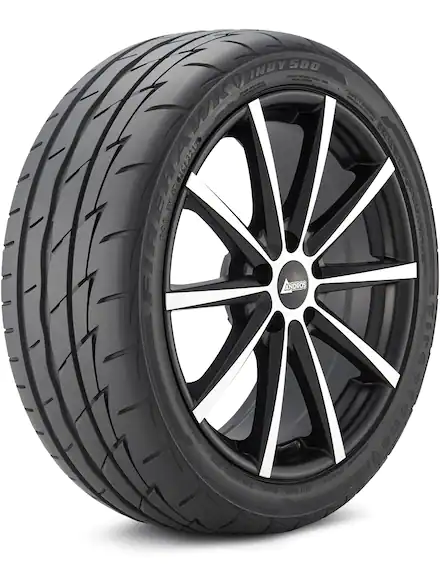
7. Firestone FireHawk Indy 500
Are you looking for an affordable ultra-high-performance tire that specializes in summer rides for your Honda Civic? The Firestone FireHawk Indy 500 is a perfect choice for you.
Overall Rating
| Treadwear | 8.6 |
| Dry Traction | 9.2 |
| Wet Traction | 8.6 |
| Noise and Comfort | 8.7 |
| Price | 8.8 |
Pros
Cons
Our Verdict
Firestone FireHawk Indy 500 is designed to provide top-notch performance in high temperatures. It also delivers sporty, high-speed handling, excellent steering response, and cornering.
Your Honda Civic will literally become a Sports vehicle with this tire. Its carbon tread rubber compound and asymmetric tread design are exceptional. These, alongside its large shoulder blocks, deliver improved handling and cornering in dry conditions.
Furthermore, the center circumferential groove helps to evacuate water. The tire’s wet traction is nice but can’t be compared to some high-performance all-season or all-weather tires. On the flip side, this tire is not meant for winter rides.
However, it’s quite impressive due to the low noise level. I think it’s a great tire because ultra-high-performance tires don’t do so well in this aspect.
Most reviews show that many users are satisfied with the tire’s tread life. While some testify of attaining 45,000 miles, others have gone over 60,000 miles. This service life is exceptional for a summer tire. However, you can only achieve this lifespan if you use it in summer season only. They excel far beyond Michelin summer tires.
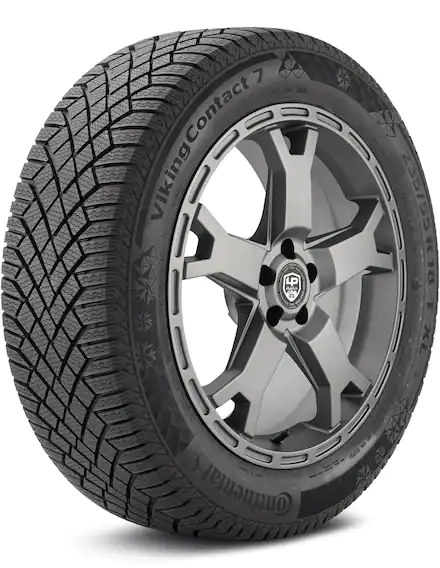
8. Continental VikingContact 7
The Continental VikingContact 7 is a powerful tire for braving harsh winter roads. This tire comes with a 60-day trial period so you may want to give this tire a try to check out its superb winter performance.
Overall Rating
| Treadwear | 8.7 |
| Dry Traction | 8.4 |
| Wet Traction | 8.8 |
| Winter Performance | 9.3 |
| Noise and Comfort | 8.8 |
| Price | 8.7 |
Pros
Cons
Our Verdict
Continental VikingContact 7 is a studless ice and snow winter tire built with a stylish tread pattern for enhanced winter ride confidence. In fact, you need this tire for your Honda Civic if you are living in a region having adequate snowfalls in winter season.
The tire’s compound is consistently flexible even in severe winter conditions. This is because it is infused with Canola oil, thereby providing an excellent grip on snow and ice. The presence of silica also improves wet performance and braking.
The tire’s groove network and intelligent pattern create a direct path for the evacuation of water and slush. This further optimizes traction in different winter weather scenarios.
Our analysis of the user reviews indicates that many consumers are indeed satisfied with the tire’s performance. They testified about the tire’s quiet and smooth ride. They say it has an exceptional performance in light, packed, deep snow, and ice. On the flip side, some users seem to be disappointed with the tire’s grip in rainy conditions.
Others have expressed dissatisfaction with its early wear. This seems to come from users who subject the tire to all-year-round use. One major thing I recommend to users is to dedicate this tire to the winter season only.
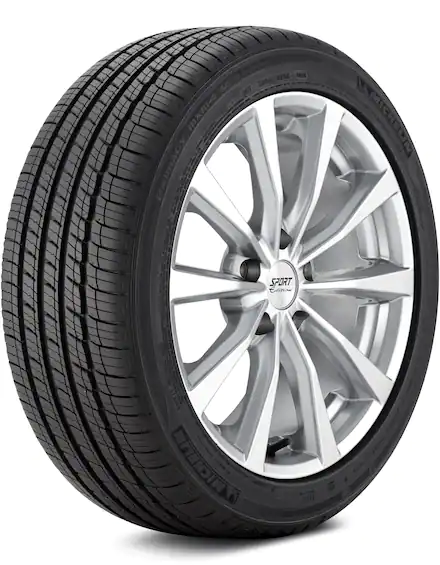
9. Michelin Primacy MXM4 ZP
The Michelin Primacy MXM4 ZP tire is a suitable zero-pressure tire for your Honda Civic. The Michelin Primacy MXM4ZP tire is built to O.E. standard, and they carry the M+S symbol. They are mostly used on luxurious sedans and sophisticated coupes.
Overall Rating
| Treadwear | 8.7 |
| Dry Traction | 9.0 |
| Wet Traction | 8.6 |
| Winter Performance | 8.0 |
| Noise and Comfort | 8.5 |
| Price | 8.6 |
Pros
Cons
Our Verdict
Michelin has made Michelin Primacy MXM4ZP such that it provides temporary self-supporting run-flat usability for up to 50 miles at around 50 mph. This is still possible after suffering complete air pressure loss due to puncture. With this, I assure you that you can’t be stranded in a lonely area due to a flat tire.
Michelin Primacy MXM4ZP offers stable handling, durability, and all-season traction. The tire is also designed to deliver light snow traction and a powerful grip like the Michelin Pilot Sport 4s.
I noticed that the ride is quite stiffer with this tire than it is with regular tires. Also, you may experience some noise, which is normal for this kind of tire. Overall, its comfort and noise levels are satisfactory.
Users have given positive feedback about the Primacy MXM4 ZP tire's dry traction, handling, and steering response. Some say the tire is exceptional on wet roads, light snow, and even in standard water. The average lifespan, according to most users is about 50,000 miles.
How Much Are Honda Civic Tires?
The cost of Honda Civic tires varies from $60 to over $370. This depends on the size and type of tire you choose for your car. It also depends on the tire brand that you choose.
What Tires Come Factory Installed On Honda Civic?
Goodyear, Continental, Hankook, and Firestone are some tire brands that come factory-installed for current Honda Civic models. However, they vary in quality, performance, and price. The 18-inch wheel 235/40R18 Goodyear Eagle Sport All-Season tire is designed for the Honda Civic Touring, Civic Sport, and Civic Si (non-HPT) models.
Meanwhile, the 17-inch wheel 215/50R17 Continental Pro Contact TX or Firestone FT140 tire is for the Civic EX. What more? Honda categorically specifies a 215/55R16 tire for the LX for which the Hankook Kinergy GT or Firestone FT140 come factory installed.
What Types of Tires Are Suitable for the Honda Civic?
Most Honda Civic users have shown that all-season tires are the most suitable for the vehicle. The tires handle different weather conditions. You can trust their performance in wet, dry, and light snow. They also have excellent fuel efficiency, tread life, and comfort.
Nevertheless, most drivers prefer a dedicated winter tire due to severe winter conditions. The same applies to summer tires. Snow tires are great for chilly, icy winters, and summer tires for long, hot summers. Dedicated tires may not do so well in other areas that are not related. Meanwhile, all-season tires do the trick for mild-to-moderate weather all around the year.
Buying Guide: How to Choose the Best Tires for Honda Civic?
Tire type, wheel size, and weather conditions are vital factors to consider when you need to find the best tire for your car. I’ve outlined some tips to help you choose the right tire for your Honda Civic.
Tire Type
Generally, tire types are either classified as bias ply or radial. The best option for your Honda Civic is radial. It is vital to know that radial tires offer top-notch performance, comfort, and fuel efficiency. They are practically better than bias-ply tires in terms of ride quality on smooth roads and highways. They are best for non-commercial vehicles like the Honda Civic LX.
Bias ply tires are built for more durability and heavier loads. They have wider footprint for stability and minimized tread wear. However, they seem less responsive and flexible compared to radial tires.
Bias ply tires are suitable for off-road use where drivers need more load capacity and durability. Here, comfort and speed are not so important. They are designed with rubber plies, overlapping at an angle. This makes the tire’s sidewall and tread seamlessly dependent on each other.
Wheel Size
The recent generation of the Honda Civic comes with 16, 17, and 18 inches wheels. Generally, the wheel size affects the vehicle’s appearance, comfort, and performance. This is why the wheel size is a vital aspect to consider when buying a tire.
There are basically three sets of numbers to identify the tire’s size. They include the width (in millimeters), aspect ratio/height (a percentage of the width), and diameter (in inches). If you find a tire with 225/50R17, it simply means 225 mm wide, a height of 50% of the width, and a 17-inch wheel fitment.
Besides getting the exact tire size for your car, it is possible to get a different size that is also compatible with the wheel. You are good to go once the tire meets your vehicle’s specifications. Automotive experts refer to this as plus or minus sizing.
Plus sizing involves increasing the wheel diameter while decreasing the aspect ratio just to maintain the overall diameter. Conversely, minus sizing involves decreasing the wheel diameter while increasing the aspect ratio to maintain the same overall diameter.
Generally, plus sizing enhances the vehicle’s appearance, handling, and steering response. However, it can result in a decline in ride quality, increased noise, and inaccurate speedometer readings.
On the other hand, minus sizing improves ride quality, increases the snow traction, and reduces noise. Unfortunately, this can adversely alter the handling, steering response, and vehicle appearance.
That said, here’s my candid opinion – ensure to buy the exact same tire that matches the OEM specification for your Honda Civic Type R. With this, you can be sure of safety and exceptional performance.
Weather Conditions
Finally, weather conditions can also affect a vehicle’s tire. Hence, you must consider this when buying a tire. I recommend that you get the exact tire that aligns with your driving and climate needs.
For instance, all-season tires are best for areas with mild weather all around the year. They can handle wet, dry, and snow conditions well. Meanwhile, you may need winter or summer tires for cold winter and hot summer seasons, respectively. For example, the Firestone FireHawk Indy 500 is a nice ultra-high-performance summer tire.
Frequently Asked Questions (FAQs)
Conclusion: Which Tire Is the Best For My Honda Civic ?
If you're a Honda Civic driver, I bet you need performance-oriented and comfort giver tires. I have unveiled some of the best Honda Civic tires in this review. They rank as some of the current best tires on top of the list in the market. Pirelli P7 AS Plus is my top recommendation for the Honda Civic while Goodyear Assurance Fuel Max and Falken Ziex ZE960 A/S are budget-friendly tires you may consider.
No doubt, your needs may be luxury, fuel economy, stable handling, or an extended tread service life. Also, if you need a tire for specific weather conditions, check out the tires available in this review.

